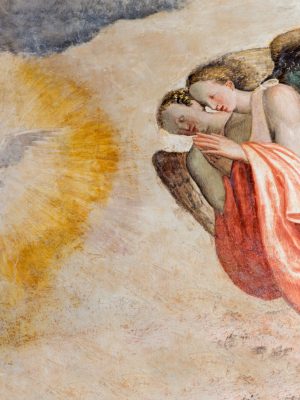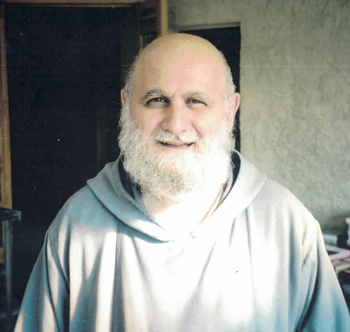An Example From Church History
Even in Church history, this problem of not appreciating the Holy Spirit’s presence and importance in daily Christian life existed! St. Augustine (A.D. 354-430) recognized the lack of theological study regarding the Holy Spirit and His mission even in his own day.
“Many books have been written by scholarly and spiritual men on the Father and the Son . . . The Holy Spirit has, on the other hand, not yet been studied with as much care and by so many great and learned commentators on the Scriptures that it is easy to understand His special character and know why we cannot call Him either Son or Father, but only Holy Spirit” (De Fide et Symbolo IX, #18 & 19: PL 40, 190, and 191).
The theology of the Holy Spirit later became a central focus for St. Augustine. His reflections on the Holy Spirit are found scattered throughout the whole of his later works.
Why Do We Not Know the Holy Spirit as We Should?
There are many reasons that account for peoples’ failure to appreciate the Holy Spirit. Usually it is a combination of a lack of understanding of Who the Holy Spirit really is and of forgetfulness of His crucial role in our lives as followers of Christ. This is true for many Catholics even today in this post-Vatican Council II period with its renewed interest in the Holy Spirit. For example, a friend told me of an incident that happened when he was at Mass one Pentecost Sunday.
When the priest rose to give the homily, he told the congregation in effect: “Since this is Pentecost Sunday, you are probably expecting to hear a sermon on the Holy Spirit. But I am not going to give any sermon on the Holy Spirit because we really don’t know that much about Him!” We can only imagine what a discouraging impression his remark must have made on the congregation!
The Notion of Spirit is Mysterious
The first and probably key factor to why we do not know the Holy Spirit is that in our human language and experience, we do not relate readily to a “spirit.” By contrast, we relate easily to the idea of a “father” and a “son.” We know what a human father is, whether through experience (e.g., of our own fathers) and/or observation of human fatherhood.
The same is true with our knowledge of what a human son is. We are all children, sons or daughters of our own parents. Some of us become parents of our own children. We also observe boys who are sons of other parents. We, therefore, relate to Jesus as the Son of God from our own human experience and observation.
But we have no experience or observation whatsoever of what a “spirit” is. The very idea of a spirit is the notion of a being without a body, something that has no visible appearance or material makeup. We find this obviously “mysterious.” We tend to shy away from what we find awkward to imagine or understand. As a result, many of us feel that we cannot think or talk about the Holy Spirit because we cannot easily relate to Him!
His Mission is Hidden
A second reason for our lack of appreciation of the Holy Spirit is that He is, as Pope St. John Paul II called Him, the “hidden God.” The Second Divine Person, the Son of God, became man by His Incarnation in the womb of the Blessed Virgin Mary. In doing so, Jesus took on a visible human appearance by which His disciples knew Him and interacted with Him. They saw Him, heard Him, spoke with Him, touched Him; they were fed by Him, taught by Him, and healed by Him through His physical presence among them. In contrast, the Holy Spirit took no visible personal form.
True, His presence was known at times in various symbolic ways, as by a “dove” at Jesus’ baptism in the Jordan (Luke 3:22) and by the “tongues of fire” that accompanied His coming at Pentecost (Acts 2:3). But there was no lasting outward presence. The reason for this was that although the Spirit was sent to carry on the mission that Jesus had begun among the disciples, He would now do it in a hidden, unseen way.
Working in the minds and hearts of those who believed in Jesus, loved Him, and followed Him, the Spirit’s presence would remain invisible. Unseen, He carries on the work of forming Christ spiritually in the disciples. This is why Jesus said at the Last Supper:
“I tell you the sober truth: it is much better for you that I go. If I fail to go, the Paraclete will never come to you, whereas if I go, I will send Him to you. When He comes, however, being the Spirit of Truth, He will guide you to all truth” (John 16:7, 13).
If Jesus had remained among the disciples in His visible human presence after the Resurrection, their faith would never have grown. After all, faith is the belief in what we do not see. The faith of the Apostles and of Jesus’ other first disciples still had to grow, despite His many appearances to them after Easter. Therefore, it was important for Our Lord to withdraw His visible, resurrected presence so that the disciples could continue to grow by believing through faith.
This is why Jesus said it was much better for the Apostles that He go away from them—precisely so that their faith could grow through the inner working of the Holy Spirit! It would not be easy for the Apostles, after having been with Jesus for so long a time, to be deprived of His visible presence. Jesus knew it would cause them sorrow: “Now that I go back to Him Who sent Me, not one of you asks Me, “Where are You going?” Because I have had all this to say to you, you are overcome with grief” (John 16:5-6).
As is often the case in life, what is best for us is not always easiest for us! But because the Apostles’ faith would now grow through a longing desire to see Jesus again and to be reunited with Him, their love for Him could also grow. This was extremely important because love, as we know, is the virtue that surpasses all the others in dignity; it is the virtue that endures forever!
Despite His going away, however, Jesus would not leave His disciples totally on their own: “I will not leave you orphaned . . . I will ask the Father and He will give you another Paraclete—to be with you always: the Spirit of Truth . . .” (John 14:18, 16-17).
“Paraclete” is a Greek word meaning, literally, “someone at the side of another person.” Jesus had been visibly at the side of His disciples as a constant Teacher and Friend, directing them. He had begun the process of their sanctification—by His preaching and miracles, His personal direction and good example, and by the experiences of His saving death and His post-Resurrection appearances.
All of these experiences had been quite visible! Now, the Holy Spirit was to be invisibly at their sides, as a Defender, an Advocate, a Consoler, directing them and fulfilling in them His great mission of making them holy. As a new “Paraclete,” the Holy Spirit would direct their continued growth in all the virtues until their holiness was complete. He would strengthen their faith until it became totally unwavering, their hope until it could endure all things, their charity until it became enkindled with great zeal. He would inspire and guide their witnessing of Christ to the very ends of the earth, even in the face of rejection, persecution, suffering, and even death itself. The Holy Spirit would do all of this in a manner that was quiet, unseen, hidden, but nevertheless, very real and quite effective. His presence would be known, not by any outward human form, but by observing the effects of His hidden presence working in and through them.
This article is taken from a chapter in The Gift of God: the Holy Spirit by Fr. Andrew Apostoli, C.F.R. which is available from TAN Books.









